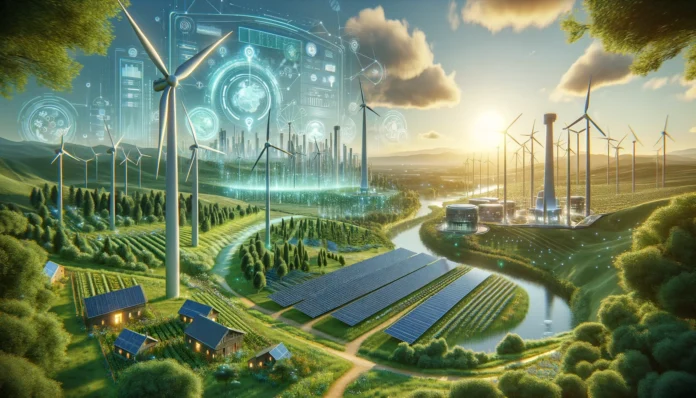In the face of escalating climate change and environmental degradation, the imperative to develop sustainable solutions has never been more pressing. The intersection of green technology and artificial intelligence (AI) presents a formidable opportunity to combat these challenges and foster climate resilience on a global scale.
Climate change, driven primarily by human activities such as fossil fuel combustion and deforestation, has ushered in a new era of environmental instability. Rising temperatures, extreme weather events, and diminishing biodiversity threaten ecosystems and human livelihoods worldwide. Addressing these complex issues requires innovative approaches that leverage the power of technology to mitigate environmental impact and build resilience in vulnerable communities.
This brings us to the Green Tech Revolution, where climate resilience is being strengthened and sustainable practices are being driven by advanced AI. AI-powered solutions are revolutionising businesses and accelerating beneficial environmental effects in a variety of fields, including precision agriculture and renewable energy optimisation.
The generation and delivery of renewable energy is one area where artificial intelligence is making major advancements. Energy networks can be optimised for dependability and efficiency by utilising machine learning algorithms. This will minimise waste and emissions while optimising the use of renewable resources like solar and wind power. Grid operators can proactively control energy distribution and anticipate fluctuations in demand thanks to predictive analytics, which guarantees a consistent supply of clean energy to consumers.
Moreover, AI-driven innovations are revolutionizing the transportation sector, a significant contributor to greenhouse gas emissions. Electric and autonomous vehicles, powered by AI algorithms that optimize routes and energy consumption, are paving the way for a greener future. From self-driving cars to electric buses and delivery drones, these technologies promise to reduce emissions, alleviate traffic congestion, and enhance urban air quality.
In agriculture, AI is empowering farmers to cultivate crops more sustainably and adapt to changing environmental conditions. By analyzing vast amounts of data, including soil composition, weather patterns, and crop health indicators, AI algorithms can provide actionable insights to optimize resource usage and minimize environmental impact. From precision irrigation systems to autonomous farming equipment, these innovations hold the potential to enhance productivity while mitigating the environmental footprint of agriculture.
AI is also essential for tracking and lessening the effects of climate change on natural ecosystems. Researchers can track changes in biodiversity, deforestation rates, and habitat loss almost instantly thanks to remote sensing technologies and AI-driven data analysis. With the goal of maintaining vital ecosystems and safeguarding fragile species, this knowledge helps with targeted conservation efforts and well-informed decision-making.
It is critical to acknowledge AI’s function as a catalyst for positive social and environmental change as well as an innovative tool as the Green Tech Revolution develops. We can steer the future towards a more resilient and sustainable state for future generations by using the power of research, technology, and policy.
In conclusion, the convergence of green technology and artificial intelligence offers unprecedented opportunities to address the urgent challenges posed by climate change. From renewable energy optimization to sustainable agriculture and conservation efforts, AI-driven solutions hold the key to building climate resilience and safeguarding the planet for future generations.





